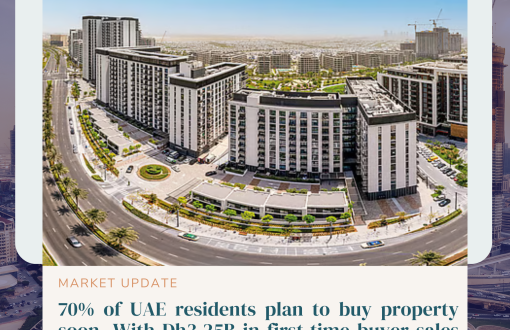The United Arab Emirates (UAE) is witnessing a surge in foreign institutional investment in its real estate sector, driven by strong returns, regulatory reliability, and economic stability. Once dismissed as a speculative market catering only to the ultra-wealthy, UAE real estate has now matured into a stable, income-generating asset class that is attracting institutional investors from Europe, the US, and Asia.
Growing Institutional Interest
Foreign institutional investors, including major pension funds and family businesses, are now viewing the UAE real estate market as a strategic investment hub. Nearly 90% of investors in luxury real estate funds in the region are institutional, with typical investment sizes ranging from $10 million to $50 million. Notably, 80% of these investors are international, while 20% comprise local family businesses and high-net-worth individuals.
The rising interest is also seen among sovereign wealth funds from Europe and Australia, although many are still in the exploratory phase. Private equity firms and structured real estate funds are also beginning to allocate long-term capital in the region.
Attractive Risk-Return Profile
Institutional investors seek real estate opportunities with a balanced risk-return ratio, focusing on markets that offer economic and political stability, strong governance, and promising growth prospects. Compared to markets like the US, where financial structures such as long-term fixed-rate loans are common, the UAE operates with floating interest rates. However, investors are able to navigate these challenges through disciplined asset and fund management, often securing substantial returns.
Despite global economic uncertainties, the UAE offers a relatively stable environment with robust regulatory frameworks, particularly within the Dubai International Financial Centre (DIFC) and Abu Dhabi Global Market (ADGM). The Dubai Financial Services Authority (DFSA) has played a key role in establishing investor confidence, ensuring transparent and well-regulated financial practices.
Market Growth and Investment Potential
The UAE’s real estate market is projected to reach a staggering $390 billion in 2024. The residential sector, in particular, has demonstrated remarkable growth, with apartment prices increasing by 19% and villa prices surging by 23% over the past year. Transaction volumes and off-plan sales are also on the rise, highlighting strong investor confidence.
While market expansion is expected to continue into 2025, growth may stabilize as developers work to meet rising demand. The UAE’s inclusion in the Brics+ group, representing 45% of the global population and 35% of global GDP, further solidifies its position as a key player in global economic and investment strategies.
Sustainability and Long-Term Value
A significant factor driving institutional interest is the UAE’s focus on sustainable and high-quality developments. Mixed-use projects, logistics hubs, and environmentally conscious real estate offerings have strengthened the market’s appeal. Investors are increasingly prioritizing properties with strong sustainability credentials, as these assets tend to maintain high resale value and offer long-term profitability.
Additionally, the UAE provides a rare combination of stability and economic dynamism compared to Western markets, where inflation, economic stagnation, and geopolitical risks are eroding returns. With moderate taxation, a strong economy, and a growing appeal to global talent, the UAE remains a prime destination for investment.
Conclusion
The UAE’s real estate market has evolved into a sophisticated, institutional-grade asset class, making it an increasingly attractive option for global investors. With regulatory safeguards, high returns, and a maturing investment landscape, foreign institutional investors are positioning themselves for long-term gains in one of the world’s most promising real estate markets.





